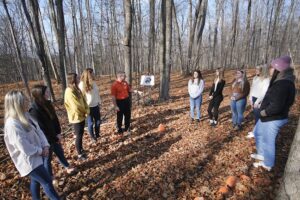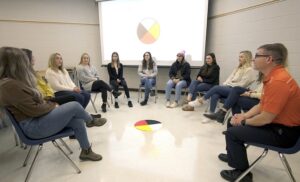Georgian College’s Community and Justice Services program offers unique Indigenous Justice course
Content courtesy of Orillia Matters
Responding to the over-representation of First Nations, Métis, and Inuit peoples in custody

ORILLIA – Georgian College (Georgian) offers more than 130+ industry-focused programs with a wide variety of meaningful course offerings that accelerate success through exceptional teaching and learning, innovation, and partnerships.
One course that Georgian is particularly proud of is the Indigenous Justice: Advocacy and Community Development course that was developed as a response to the over-representation of First Nations, Métis, and Inuit peoples in custody. Introduced in 2016, it was created by Georgian faculty and staff in collaboration with the Program Advisory Committee and Indigenous community members.
Georgian is the only college in the Ontario system to offer a course of this kind.

What does the Indigenous Justice course focus on?
Students are introduced to the three Indigenous groups in Canada (First Nations, Métis, and Inuit Peoples) and to an Elder who provides an Anishinaabe teaching perspective.
“Because of the location of Georgian and the fact that I’m Ojibway and a member of the Red Rock Indian Band, we focus on the Anishinaabe cultural practices and teachings,” says Georgian professor Lance Triskle.
Since the program explores the over-representation of First Nations, Métis, and Inuit peoples in custody, some topics touch on:
- How the Criminal Code and the Corrections and Conditional Release Acts address the high number of Indigenous peoples in the Canadian legal system;
- The Supreme Court of Canada decision of R. v. Gladue, where the court required all parties in the justice system to consider alternative sentences to custody for all Indigenous offenders; and
- The unique systemic and background factors leading to the high number of Indigenous offenders in institutional custody and community corrections.
Triskle explains that the program delves into specific federal corrections programs and practices designed to reduce the relapse recidivism of Indigenous offenders. Students also discuss the impact of the Indian Residential School System on Indigenous peoples and participate in a simulated Restorative Justice Circle.

What makes the Indigenous Justice course unique?
“The Indigenous Justice course is a response the Truth and Reconciliation Commission Calls to Action,” says Triskle. “Specifically, Call to Action 62, which calls for teachers to integrate Indigenous knowledge and teaching methods into classrooms.”
The course is also a response to the National Inquiry into Murdered and Missing Indigenous Women and Girls Calls to Justice, Call to Justice 11 Calls for Educators. It states, “We call upon all elementary, secondary, and post-secondary institutions and education authorities to educate and provide awareness to the public about missing and murdered Indigenous women, girls, and 2SLGBTQQIA people, and about the issues and root causes of violence they experience.”
It’s important to note that this hands-on course is the only one of its kind offered at an Ontario college exclusively discussing Indigenous justice. Students learn about the distinct differences between Métis, Inuit, Anishinaabe, and Haudenosaunee cultures. In addition, students discuss the similarities between Indigenous groups in Canada and their distinct customs and language.
During both institutional and community corrections field placements, students will work with Indigenous accused and offenders. Through exposure to Ojibwe cultural practices and teachings, students develop empathy for the specific unique worldview of Indigenous views in general and specifically, the Anishinaabe peoples.
Students on field placement in probation and parole offices are exposed to considerations for Pre-Sentencing Reports. As well, they’ll apply the knowledge acquired from the course during placements at the Orillia Courthouse, and Barrie and Georgian Bay Native Friendship Centres.
Community impact
“The Indigenous Justice course is like a pebble dropped into a pond,” says Triskle. “Much like the pebble creates ripples in the water, the course creates ripples throughout the community. When students go out on placement, they take the knowledge from the course into their institutional and community corrections settings. The knowledge helps them to appreciate some of the causes of the high numbers Indigenous offenders in provincial jails and correctional centres and federal penitentiaries.”
Triskle adds that students in the program feel empowered to seek more knowledge about other Indigenous peoples in Canada, feel empathy towards Indigenous offenders that they work with during their placements, and are exposed to alternative methods of sentencing for offenders beyond the traditional court process.
Questions? Contact Community and Justice Services Program Co-ordinator Joshua Barath at joshua.barath@georgiancollege or 705.418.3395.
Learn more about Georgian’s Community Safety programs at GeorgianCollege.ca or join us for Virtual Winter Open House on Jan. 21.


